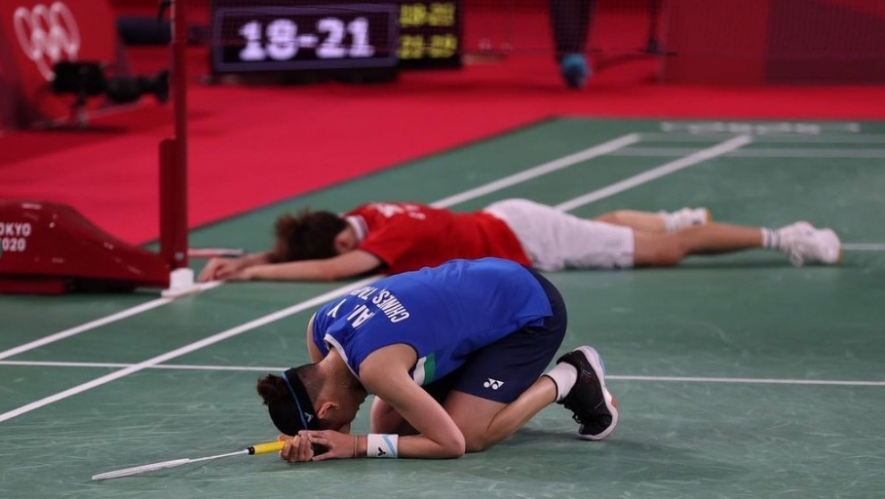Lightning and the Backhand Swish: An Ode to Tai Tzu-ying and Yufei Chen

Gold Medallist Yufei Chen (foreground) and Tai Tzu-ying just after the conclusion of their women’s singles final at the Tokyo Olympics on Sunday (Pic: Twitter).
The ideal rain is one which lasts through the night. Steady tempo, interspaced with spells of intensity. A bit of wind, the draft which it produces — cold yet refreshing — creating momentary changes in the experience, in the indulgence. A sedate breather, then the rain again. We, invariably and unconsciously, get intertwined with this rhythm specific to the night rain, flowing with its uninterrupted music and emotion as if it was our existential calling at the time. Much like how we are captivated by two individuals in hyper-exalted state during a badminton match where Olympic laurels are at stake.
Badminton, and the rain... There is static running through both, and magic, in the steady spells they take us through, where we flow with the random rhythm and the highs and lows in intensity they provide, knowing where they come from and what they are capable of, the shots and the drops, whoever the players are, whatever the size and shape of the clouds are.
Then lightning strikes. The light reaches us first, and then the sound, in the chronology pre-determined by the physical laws set by heaven itself, no less.
Click | For More Coverage of the Tokyo Olympics From Newsclick Sports
We snap out of a reverie surprised. Happily surprised. What was that? We ask. Then we realise. It takes a good second or two… That was light, beauty personified in its own right but polarising as far as how people perceive it. That was also a backhand smash by Tai Tzu-ying, and again, a backhand cross-court flick by Yufei Chen, lightning bolts out of the blue, even if we expect it, knowing it lurks behind the clouds and mist — a cover — created by the steady spell of drops, volleys and smashes. Yet, we hardly know when it strikes.
The backhand kill shots are polarizing as well — for players, fans, and for coaches, who cringe at its usefulness when lesser mortals execute it, with or without success. It is not a high percentage shot, or so the justification goes. It also doesn’t offer the same power as the forehand one, comes another critical observation, while someone else ponders on the accuracy and risk it involves. But we all exclaim too, with disbelief and well as awe, in legible and illegible superlatives, when the smash just came from the racquet of a Lin Dan, a Taufiq Hidayat, or like this Sunday at the Tokyo Olympics final, from Tzu-ying and Chen, the silver and gold medalists.
Also Read | Tokyo Drift: Indian Hockey Team on Verge of Bringing it Home; Beats Britain to Enter Semis
The backhand smash and flick are works of art, we all agree. It, however, is science personified too. Or rather, it is pushing science, physiology and motion dynamics to the extreme of physical laws the game adheres to. How much can the player stretch these laws? Well, that is not defined in any coaching manual. What is defined is the wrist position it entails, the angle of the body when a player launches into the set of movements that would eventually result in the completion of the shot. And of course, the temperament of the player, to decide whether it should be a defensive lob to the baseline of her opponent — the route she is expecting — or an attempted kill that could make or break the point. It invariably makes it for the player. But that’s because we only tend to notice it when the masters do it, when it heralds success, and a point. Better still, a game or a match point.
If the backhand flourish in badminton is art, then it carries with it the benefit of subjectivity, and the luxury of material ambiguity like only a classic painting does. You win, we find legitimacy and vindication in the swish of the racquet. You lose, and we celebrate the tragic beauty in it. Last night we mourned the romance in the tragic end of the campaign for Tzu-ying as well as celebrated Chen’s artistic validation [if she needed one that is]. What a special evening it was indeed. The rare chance to experience the highs and lows of art in sport in an hour or so of indulgence.
The backhand smash or flick is all about surprise. Their success is made or broken by the rhythm set by a player in a particular rally, or even in the two or three rallies before that. The smokescreen Chen produces, or the lull Tai Tzu-ying creates because the former is almost always trying to keep the opponent guessing while the latter is trying to be nuanced and suave, dropping, flicking, sticking to the forehand, kissing the net, even going for a forehead around-the-head loft or smash rather than a backhand blinder. The gold medal is at stake, no less. Why would Tzu-ying or Chen go high risk, and to the relatively lesser power of the backhand, you wonder.
We are lesser mortals and hence we doubt. It is a game of fine margins, but it is also a game of glorious extravaganza via racquet. And the riskier it is, the more beautiful the feeling the moment leaves us with. Drenched!
Also Read | Bolt from the Blue: Marcell Jacobs of Italy is the Fastest Man at Tokyo Olympics
Tzu-ying drew Sindhu into a sense of reverie in the semifinals on Saturday. That is exactly how the rain captures us. And in that spot, we felt Sindhu was almost enjoying the rain — the refreshing draft of moisture-laden energy on their faces. Tzu-ying is that energy, and a million drops of it too. And when a million drops splash into a million drops across the net, we get Tzu-ying vs Chen, a match we hoped would never end. Being neutral has its perks, you see.
Whip came the backhands. Lightning strikes. It strikes again, twice... thrice, tearing apart that old saying which makes us believe this natural phenomenon can never hit us more than once. They left us drenched, breathless and enlightened too.
For seeing light is what sport is all about. The light at the end of a play, the light which a point heralds, the different light a loss attracts, the light which a victory brings in, and light which the celebrating smile brings out after the initial shriek that comes involuntarily, done more in relief than aggression or intent to disrespect.
Also Read | Greatness on Repeat: PV Sindhu Beats He Bingjiao to Win Bronze at Tokyo Olympics
India saw that light Sunday evening, the first day of August, the month in which the country celebrates its independence day as well as its sports day, commemorating the birth anniversary of one of its Olympic icons. Sindhu has become an icon on this day in Tokyo, adding bronze to the silver she won five years back.
Light is defined by what it manages to illuminate. And, being there in the bronze medal playoff, Sindhu was immersed in both the brightness of the occasion, as well as touched by its magic. The bronze just adds to the lux, the luminosity, and to her legend.
As the Indian star left the court in Tokyo, as a victor in every right, she, much like us, will remember too how it was to see Chen win gold, or Tzu-ying win silver [both winners in my book], or He Bingjiao’s stutter. The latter Sindhu would have felt from up close, sensing the Chinese player’s emotion and heartbreak.
Sindhu was part of it. We were too. For we all were tuned to the music badminton provides, the song its rain gifts, and the enlightenment, the kind only these four players could provide at this point in the universal continuum of the game.
Get the latest reports & analysis with people's perspective on Protests, movements & deep analytical videos, discussions of the current affairs in your Telegram app. Subscribe to NewsClick's Telegram channel & get Real-Time updates on stories, as they get published on our website.
























